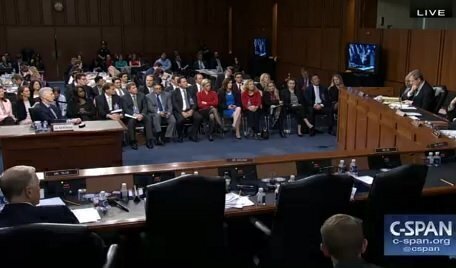Supreme Court nominee Neil M. Gorsuch faced a Senate Judiciary committee on Tuesday looking for answers about his thoughts on landmark court cases, his own rulings, and the limits of constitutional powers.
 Senate Judiciary chair Chuck Grassley warned Gorsuch at the outset that he would be asked about many landmark cases, and also about cases where Gorsuch was involved in decisions on the federal bench.
Senate Judiciary chair Chuck Grassley warned Gorsuch at the outset that he would be asked about many landmark cases, and also about cases where Gorsuch was involved in decisions on the federal bench.
Grassley said that Gorsuch should follow the example of Ruth Bader Ginsburg and not comment on decisions he has made as a federal judge. Gorsuch was also hesitant, at first, to talk about landmark cases that were mentioned by Grassley, such as Roe v. Wade.
“I would be tipping my hand and suggesting to litigants I’ve already made up my mind about their cases," Gorsuch said. "If it looks like I’m giving hints or previews, I think that’s the beginning of the end of the independent judiciary.”
When asked directly by Dianne Feinstein about Roe, Gorsuch did agree that cases that have been precedents for decades have a different status in our legal system. Gorsuch also didn’t comment extensively about two landmark gun cases mentioned by Feinstein.
Orrin Hatch then gave Gorsuch a chance to rebut charges from some Democrats that Gorsuch was beholden to special interests. “A judge is there to make sure that every person, poor or rich, mighty or meek, gets equal protection of the law,” Gorsuch said. “I put my ego aside when I put on that robe and I open my mind and I open my heart and I listen.”
When asked by Patrick Leahy, a Democratic, about the failed nomination of Merrick Garland, Gorsuch declined to comment on what he called a political issue. Gorsuch was also asked by Leahy about the Trump administration’s immigration ban orders; he declined to comment on what he called an active case, but made a general statement about the free exercise of religion and the First Amendment.
Another Democrat, Amy Klobuchar, asked Gorsuch to comment on the concept of video cameras in the Supreme Court. “It’s not a question that I confess I’ve given a greal deal of thought to,” Gorsuch said. “I’ve experienced more cameras in the last few weeks than I’ve experienced in my lifetime.”
Gorsuch also was asked his thoughts on the concept of Chevron deference, a legal theory he’s criticized in past federal court rulings that forces judges to defer in cases where government rules are ambiguous. “I think it's a separation of powers question,” Gorsuch remarked, again not getting into details about his rulings.
Toward the end of his testimony on Tuesday, Gorsuch did addresses criticism offered by President Donald Trump about federal judges who have ruled against his immigration ban executive order.
"When anyone criticizes the honesty, integrity, the motives of a federal judge, I find that disheartening, I find that demoralizing, because I know the truth," he said.
Earlier in the day, when asked by Grassley, Gorsuch said politics and political figures wouldn’t factor into his thinking on the court.
“I have no difficulty ruling against or for any party other than based on what the law and the facts of a particular case require,” Gorsuch told the panel. “And I’m heartened by the support I have received from people who recognize that there’s no such thing as a Republican judge or a Democratic judge — we just have judges in this country,” he said.\
Gorsuch's testimony will continue on Wednesday at 9:30 a.m., where he will answer more questions from the Senators, with the questioning period limited to 20 minutes for each committee member.






